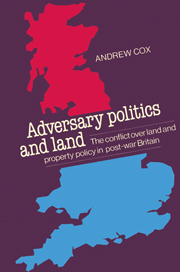Book contents
- Frontmatter
- Contents
- Preface
- PART A INTRODUCTION
- PART B THE PROBLEM OF LAND AND PROPERTY IN BRITAIN AND THE EFFECTIVE LIMITS ON GOVERNMENT POLICY INITIATION
- PART C THE HISTORY OF ADVERSARIAL POLICY FAILURE IN LAND AND PROPERTY IN POST-WAR BRITAIN
- 4 Labour, the 1947 system and the collapse of the development market (1945—1951)
- 5 The Conservative free market approach and the 1950s property boom (1951—1964)
- 6 Labour, the Land Commission and the problems of implementation (1964–1970)
- 7 The second failure of the Conservative free market approach and the 1970s property boom (1970–1974)
- 8 Labour and the failure of the Community Land Act (1974–1979)
- PART D CONCLUSION
- Notes
- Index
7 - The second failure of the Conservative free market approach and the 1970s property boom (1970–1974)
Published online by Cambridge University Press: 29 September 2009
- Frontmatter
- Contents
- Preface
- PART A INTRODUCTION
- PART B THE PROBLEM OF LAND AND PROPERTY IN BRITAIN AND THE EFFECTIVE LIMITS ON GOVERNMENT POLICY INITIATION
- PART C THE HISTORY OF ADVERSARIAL POLICY FAILURE IN LAND AND PROPERTY IN POST-WAR BRITAIN
- 4 Labour, the 1947 system and the collapse of the development market (1945—1951)
- 5 The Conservative free market approach and the 1950s property boom (1951—1964)
- 6 Labour, the Land Commission and the problems of implementation (1964–1970)
- 7 The second failure of the Conservative free market approach and the 1970s property boom (1970–1974)
- 8 Labour and the failure of the Community Land Act (1974–1979)
- PART D CONCLUSION
- Notes
- Index
Summary
The power of initiation: Heath and the Selsdon approach. The power of constraint: the speculative property boom of 1971–1973. Heath at the crossroads: social democracy versus market constraints.
In the early 1970s the compensation and betterment problem was made more difficult to resolve because the government had to deal with financial speculation in the rental values of commercial properties. This speculation was encouraged by the Heath government's return to an adversarially based policy for land values. The Land Commission was abolished and a ‘regulatory’ solution was imposed on the market similar to that which had existed between 1959 and 1964, when an earlier boom in property had occurred with adverse electoral consequences for the Conservative government.
The aim of the government in 1970 was the stimulation of industrial regeneration through the private market. But very limited state taxation on property speculation, no state role in facilitating land supply and a lax monetary policy was to lead, with declining industrial profitability, to a sustained property boom. This came about because the government's power of initiation was used in ignorance of the power of constraint which its free market approach gave to financial institutions. The government found, between 1972 and 1973, that it was unable to control these interests: they invested in property rather than industry. Consequently, massive capital gains were made by a few, and property millionaires became part of the ‘unacceptable face of capitalism’. This led the Conservative government to set aside its free market ideals and to impose controls on business rents.
- Type
- Chapter
- Information
- Adversary Politics and LandThe Conflict Over Land and Property Policy in Post-War Britain, pp. 155 - 175Publisher: Cambridge University PressPrint publication year: 1984



